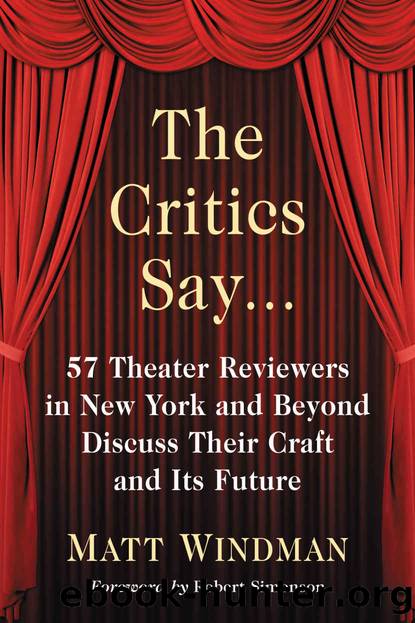The Critics Say...: 57 Theater Reviewers in New York and Beyond Discuss Their Craft and Its Future by Matt Windman

Author:Matt Windman [Windman, Matt]
Language: eng
Format: epub
Publisher: McFarland & Company
Published: 2016-04-20T07:00:00+00:00
7
* * *
Readers
MATT WINDMAN: What kind of audience do you see yourself writing for?
Steven Suskin: Different readerships have different expectations.
Hilton Als: Thatâs a very interesting questionâand one that I donât think I can answer. If you have an audience in mind, then youâre not really writing. I think you need to just do your writing. Frankly, Iâve never felt inhibited at the New Yorker or the Village Voice.
Jesse Green: I donât know who my readers areâand I donât know how I could learn. I guess I have a certain impression, but I fear itâs a stereotype because itâs based on occasional encounters, rather than on any kind of reliable data. New York magazine hosts what it calls the Vulture Festival each year, which is kind of like the New Yorker Festival, but less stuffy. A lot of readers come to that, so you get a sense of what theyâre like. My feeling is that they are culturally savvy. They seem to be youngish, but thereâs also an older generation of New Yorkers who have always read New York magazine for its smart tone and cultural coverage. Do they go to the theater more than the readers of the Village Voice or the New York Times? I have no way of knowing that. In any case, it doesnât influence my writing. The dirty secret of all writing is that youâre not writing for an audienceâyouâre writing for yourself.
John Simon: To some extent, you have to play with the expectations of the publication and its mucky-mucks, but essentially I am not influenced by the publicationâeven ones like the New Criterion or the Weekly Standard. As a result, I may be a little too much for some people. I canât help it. That means too much to me to skirt.
Robert Faires: The audience is kind of invented in my head. It tends to be somebody who shares my love of theater and who wants to know whatâs happening out there. I donât have a very clear sense of demographics. When I was in my twenties, I figured that people in their twenties were reading me. Now that Iâm in my fifties, I couldnât tell you whether people in their twenties are reading me. I have no idea if my audience is male, female, married, or single. That stuff is kind of a blank for me.
Michael Riedel: To be honest, Iâm really writing for myself. First and foremost, what I write has to interest me. If it bores me, itâs going to bore anyone reading it. If it amuses me, or if I find it interesting, then I can only assume that people who are reading it will find it interesting.
Chris Jones: I donât want to be arrogant, but I know a lot of plays. On the other hand, I write for a general newspaper, so my job is not to write for specialists. For the most part, I write for ordinary people. Chicago is a no-nonsense kind of city, so itâs not like I can write academic theses on these shows.
Download
This site does not store any files on its server. We only index and link to content provided by other sites. Please contact the content providers to delete copyright contents if any and email us, we'll remove relevant links or contents immediately.
Call Me by Your Name by André Aciman(18967)
Ready Player One by Cline Ernest(12839)
How to Be a Bawse: A Guide to Conquering Life by Lilly Singh(6693)
Wiseguy by Nicholas Pileggi(4586)
The Kite Runner by Khaled Hosseini(4437)
On Writing A Memoir of the Craft by Stephen King(4214)
The Crown by Robert Lacey(4105)
Audition by Ryu Murakami(4099)
Call me by your name by Andre Aciman(4073)
Harry Potter and the Cursed Child: The Journey by Harry Potter Theatrical Productions(3966)
Gerald's Game by Stephen King(3918)
The Perils of Being Moderately Famous by Soha Ali Khan(3783)
Dialogue by Robert McKee(3583)
Dynamic Alignment Through Imagery by Eric Franklin(3489)
Apollo 8 by Jeffrey Kluger(3200)
How to be Champion: My Autobiography by Sarah Millican(3186)
Seriously... I'm Kidding by Ellen DeGeneres(3100)
Darker by E L James(3088)
History of Dance, 2E by Gayle Kassing(3000)
